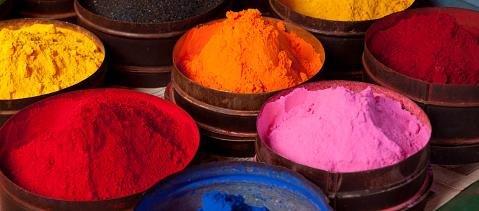Atlas, a global provider of light and weathering testing equipment, works with manufacturers across these industries to evaluate how reformulated products perform under real-world conditions. The SUNTEST® platform, used in labs worldwide, relies on high-intensity xenon arc lamps to simulate sunlight and indoor lighting. Using SUNTEST, R&D teams can rapidly screen the light stability of colors, other ingredients, and entire formulations within days.
Furthermore, within just one week, perform ASLT (accelerated shelf-life testing) to simulate six to 12 months of product shelf-life at indoor points of sale. All testing is designed to help catch color shifts, insufficient light stability, or packaging failures before products reach the market.
A Shift from Synthetic Dyes to Natural Pigments
In food manufacturing, “food coloring” is a catch-all term, but there’s a critical difference between synthetic dyes and natural pigments.
Synthetic dyes, such as Red No. 3 and others under scrutiny, are chemically stable and fully water-soluble. Natural colorants, by contrast, are typically pigment-based—suspended rather than dissolved—and more sensitive to light, oxygen, pH, and heat.
This shift introduces new formulation risks. Natural pigments can fade, shift hue, or react with other ingredients under storage or retail conditions. A fruit beverage colored with anthocyanins, for example, may darken or separate if exposed to sunlight or heat—especially in the presence of acids like citric acid. These are the kinds of issues accelerated testing can uncover early.
Considerations for Pharmaceuticals
Pharmaceutical products face similar demands: photostability of the API, proof for sufficient protection by the packaging, strict regulatory oversight, and consistency across dosage forms. The FDA’s ban on Red No. 3 in ingested drugs takes effect January 18, 2028, requiring drug makers to validate new formulations that meet stringent stability and packaging requirements. Atlas supports these efforts with accelerated SUNTEST photostability testing in compliance with the industry guidelines of ICH Q1B.
Packaging and Performance Under Pressure
Packaging also plays a role. Many materials offer limited protection against UV or oxygen, which can degrade natural pigments. Without the right testing, even seemingly stable formulations may deteriorate in transit or on the shelf.
“Many manufacturers are already facing tight timelines,” said Oliver Rahäuser, Sr. Product Manager at Atlas. “We’ve seen this trend build globally, and it’s now accelerating in the U.S. Our goal is to give teams the technical insight they need to reformulate confidently and keep pace with change.”
For over 100 years, Atlas has been a leader in materials testing, offering a complete line of weathering testing instruments and services for accelerated and natural weathering. Atlas serves a range of industries including automotive; paint and coatings; plastics and additives; textiles; pharmaceutical and consumer products; architecture; aerospace; photovoltaics; and packaging. Its Atlas Weathering Services Group (AWSG) operates five laboratories and 25 outdoor exposure sites around the world. Atlas is ISO 17025 and ISO 9001:2008 registered. Atlas products are designed and manufactured to conform to international, national and industry standard test methods, including ISO, ASTM, DIN, JIS and numerous others.
Atlas is headquartered in Mount Prospect, Illinois. It is a business unit of AMETEK Measurement, Communications & Testing, a division of AMETEK, Inc. (NYSE:AME), AMETEK, Inc. is a leading global provider of industrial technology solutions serving a diverse set of attractive niche markets with annual sales over $7.0 billion.
www.atlas-mts.com
Atlas Material Testing Technology GmbH
Vogelsbergstr. 22
63589 Linsengericht-Altenhaßlau
Telefon: +49 (6051) 707-160
Telefax: +49 (6051) 707-161
http://atlas-mts.de
Global Marketing Communications Manager
Telefon: +49 (6051) 707-160
Fax: +49 (6051) 707-161
E-Mail: sandra.schneider@ametek.com
![]()
